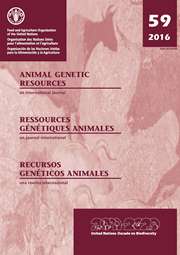The Thirteenth Regular Session of the Commission on Genetic Resources for Food and Agriculture took place in Rome in July 2011Footnote 1. The Commission approved the launch of the first call for project proposals under the Funding Strategy for the Implementation of the Global Plan of Action for Animal Genetic Resources.Footnote 2 The call was published on the Funding Strategy web pageFootnote 3 in September 2011. The Commission agreed to limit the initial maximum allocation per project to US$50 000 for single-country projects and US$100 000 for bilateral, regional or multilateral projects and to limit the length of projects to not more than two years.
The Commission reviewed progress made to date in the implementation of the Global Plan of Action. In line with the reporting schedule agreed at its previous session, the Commission had available to it a report of FAO's activitiesFootnote 4 in support of the implementation of the Global Plan of Action and a report on the activities of international organizationsFootnote 5. The Commission welcomed the progress made and emphasized the importance of future collaboration between FAO and other organizations including breeding industry organizations. It also invited FAO to work further on the development of targets and indicators to evaluate progress in the implementation of the Global Plan of Action. The next phase in the reporting schedule will be the preparation country reports on implementation activities at national level. In January 2012, countries will be requested by FAO to complete an electronic questionnaire based on the template agreed upon by the Commission at its previous session. The Commission also stressed the need for countries to update their breed-related data in the Domestic Animal Diversity Information System (DAD-IS). A new status and trends report on animal genetic resources will be produced by FAO in time for the meeting of the Intergovernmental Technical Working Group on Animal Genetic Resources, currently planned for October 2012, and more comprehensive and up-to-date breed population figures are urgently required if global trends are to be monitored adequately.
The Commission endorsed five guideline publications prepared by FAO to support countries in their implementation of the Global Plan of Action. Guidelines on Developing the institutional framework for the management of animal genetic resources Footnote 6 and Surveying and monitoring of animal genetic resources Footnote 7 are in press, and guidelines on Phenotypic characterization of animal genetic resources, Molecular genetic characterization of animal genetic resources, and Cryoconservation of animal genetic resources are forthcoming in 2012.
This was also the Commission's first meeting since the adoption of the Nagoya Protocol on Access and Benefit Sharing. The Commission noted with appreciation the recognition that the Protocol gives to the importance and special nature of genetic resources for food and agriculture. It invited countries to take these factors into account when addressing access and benefit sharing. It decided to establish an Ad Hoc Technical Working Group on Access and Benefit-sharing for Genetic Resources for Food and Agriculture. The Commission invited FAO to assist countries to initiate the development of policies and protocols for the exchange of animal genetics resources for the purpose of multicountry activities, including gene banking, and requested its Intergovernmental Technical Working Group on Animal Genetic Resources to discuss measures to facilitate international exchange of genetic material. The Commission invited countries to consider, in the development and implementation of national access and benefit sharing arrangements, the importance and specific characteristics of animal genetic resources and their role in food security.
Another important recent development has been the establishment of the Sub-Regional Focal Point for Animal Genetic Resources in West and Central Africa, which adds to the existing Regional Focal Points in Europe and in Latin America and the Caribbean. The Commission called for further effort to establish or re-establish focal points in other regions and subregions.
The Commission Meeting was preceded by a special information seminar on climate change and genetic resources for food and agriculture. A Background Study Paper on Climate change and animal genetic resources: state of knowledge, risks and opportunities Footnote 8 was presented at the seminar, along with similar papers on other subsectors of genetic resources. Awareness of the significance of climate change for the management of genetic resources was evident throughout the week's discussions. The Commission specifically requested that FAO, in its training and capacity building activities, ensure that emphasis is given to the threat posed by climate change and to the roles of well-adapted species such as camels.


